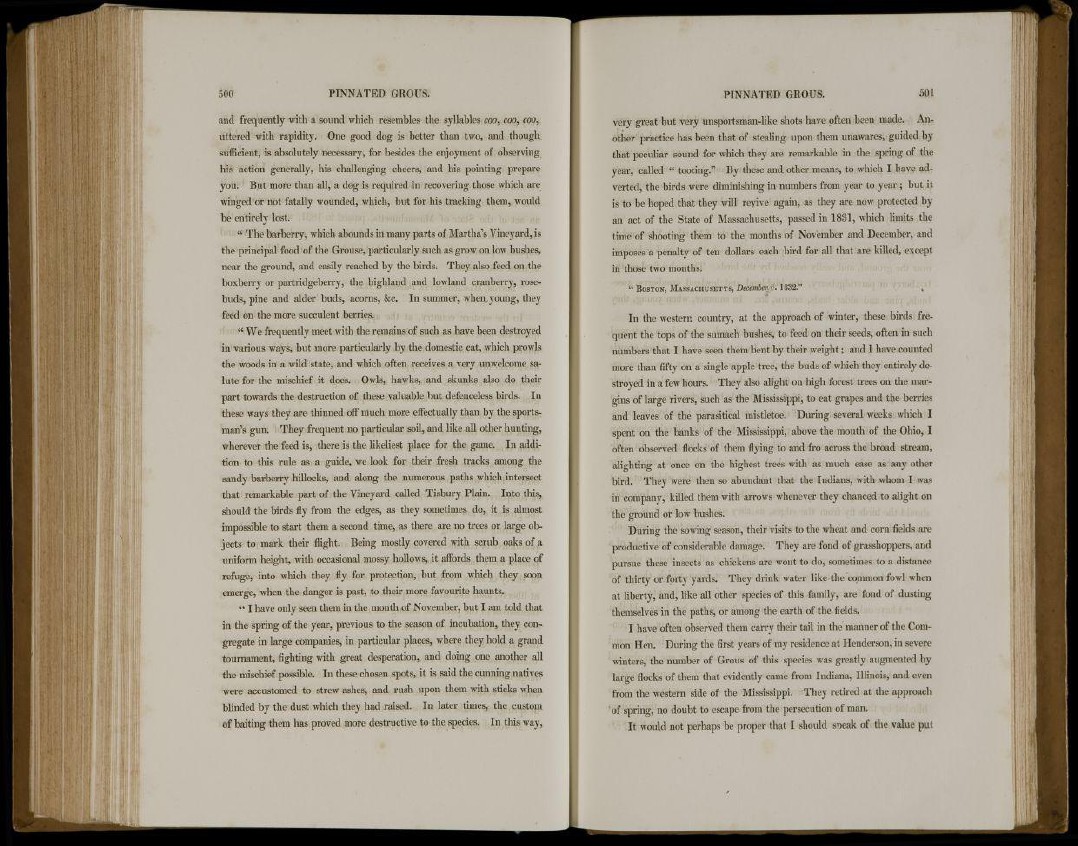
and frequently with a sound which resembles the syllables coo, coo, coo,
uttered with rapidity. One good dog is better than two, and though
sufficient, is absolutely necessary, for besides the enjoyment of observing
his action generally, his challenging cheers, and his pointing prepare
you. But more than all, a dog is required in recovering those which are
winged or not fatally wounded, which, but for his tracking them, would
be entirely lost.
" The barberry, which abounds in many parts of Martha's Vineyard, is
the principal food of the Grouse, particularly such as grow on low bushes,
near the ground, and easily reached by the birds. They also feed on the
boxberry or partridgeberry, the highland and lowland cranberry, rosebuds,
pine and alder buds, acorns, &c. In summer, when.young, they
feed on the more succulent berries.
" We frequently meet with the remains of such as have been destroyed
in various ways, but more particularly by the domestic cat, which prowls
the woods in a wild state, and which often receives a very unwelcome salute
for the mischief it does. Owls, hawks, and skunks also do their
part towards the destruction of these valuable but defenceless birds. In
these ways they are thinned off much more effectually than by the sportsman's
gun. They frequent no particular soil, and like all other hunting,
wherever the feed is, there is the likeliest place for the game. In addition
to this rule as a guide, we look for their fresh tracks among the
sandy barberry hillocks, and along the numerous paths which intersect
that remarkable part of the Vineyard called Tisbury Plain. Into this,
should the birds fly from the edges, as they sometimes do, it is almost
impossible to start them a second time, as there are no trees or large objects
to mark their flight. Being mostly covered with scrub oaks of a
uniform height, with occasional mossy hollows, it affords them a place of
refuge, into which they fly for protection, but from which they soon
emerge, when the danger is past, to their more favourite haunts.
" I have only seen them in the month of November, but I am told that
in the spring of the year, previous to the season of incubation, they congregate
in large companies, in particular places, where they hold a grand
tournament, fighting with great desperation, and doing one another all
the mischief possible. In these chosen spots, it is said the cunning natives
were accustomed to strew ashes, and rush upon them with sticks when
blinded by the dust which they had raised. In later times, the custom
of baiting them has proved more destructive to the species. In this way,
very great but very unsportsman-like shots have often been made. Another
practice has been that of stealing upon them unawares, guided by
that peculiar sound for which they are remarkable in the spring of the
year, called " tooting." By these and other means, to which I have adverted,
the birds were diminishing in numbers from year to year; but it
is to be hoped that they will reyive again, as they are now protected by
an act of the State of Massachusetts, passed in 1831, which limits the
time of shooting them to the months of November and December, and
imposes a penalty of ten dollars each bird for all that are killed, except
in those two months.
" BOSTON, MASSACHUSETTS, December, t . 1832." ,
In the western country, at the approach of winter, these birds frequent
the tops of the sumach bushes, to feed on their seeds, often in such
numbers that I have seen them bent by their weight; and I have counted
more than fifty on a single apple tree, the buds of which they entirely destroyed
in a few hours. They also alight on high forest trees on the margins
of large rivers, such as the Mississippi, to eat grapes and the berries
and leaves of the parasitical mistletoe. During several weeks which I
spent on the banks of the Mississippi, above the mouth of the Ohio, I
often observed flocks of them flying to and fro across the broad stream,
alighting at once on the highest trees with as much ease as any other
bird. They were then so abundant that the Indians, with whom I was
in company, killed them with arrows whenever they chanced to alight on
the ground or low bushes.
During the sowing season, their visits to the wheat and corn fields are
productive of considerable damage. They are fond of grasshoppers, and
pursue these insects as chickens are wont to do, sometimes to a distance
of thirty or forty yards. They drink water like the common fowl when
at liberty, and, like all other species of this family, are fond of dusting
themselves in the paths, or among the earth of the fields.
I have often observed them carry their tail in the manner of the Common
Hen. During the first years of my residence at Henderson, in severe
winters, the number of Grous of this species was greatly augmented by
large flocks of them that evidently came from Indiana, Illinois, and even
from the western side of the Mississippi. They retired at the approach
of spring, no doubt to escape from the persecution of man.
It would not perhaps be proper that I should s^eak of the value put